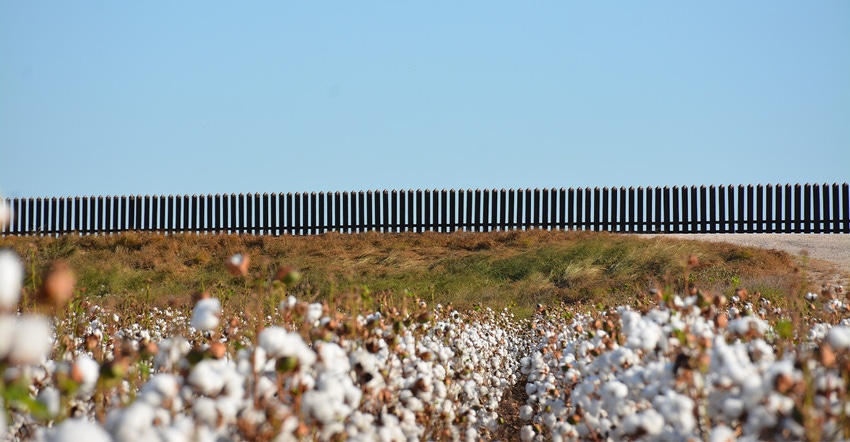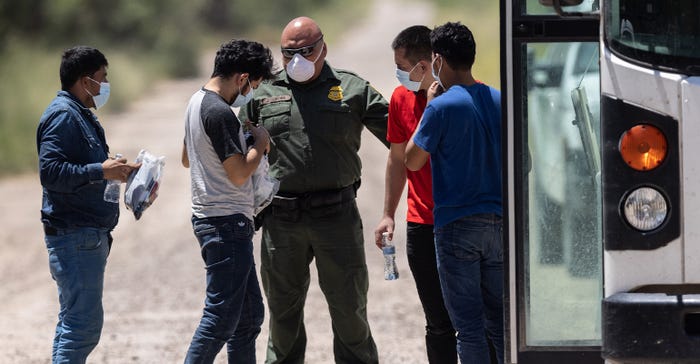
Farmers and ranchers along the southern border have been asking for a pause of asylum seekers after seeing a huge influx of individuals illegally crossing their property in recent months. And a U.S. Supreme Court’s order issued Aug. 24 for the federal government to restore the previous administration’s ‘Remain in Mexico’ policy may do exactly that.
In mid-August, American Farm Bureau Federation Zippy Duvall spent several days visiting with farmers and legislators in the area discussing the impacts on an influx of individuals crossing the border that is putting farmers in the crosshairs.
The tour started in McAllen, Texas, then to Mission, Del Rio and on to Las Cruces, New Mexico, and Deming, N.M. Duvall also hosted a roundtable with farmers and ranchers from both New Mexico and Arizona in Lordsburg, New Mexico.

(Photo by John Moore/Getty Images)
“They’ve experienced people coming across for decades, but never at the levels seen today,” Duvall adds. These farmers and ranchers are worried about their safety, security of their property and farm machinery and equipment as some have had their homes looted, fences torn down numerous times in a day and water sources tampered with and compromised, he continues.
Russel Boening, president of the Texas Farm Bureau, notes that farmers in McAllen and then upriver to Del Rio face different issues caused by the same problem. In McAllen, family units and unaccompanied minors are turning themselves into border agents seeking asylum. Border agents are overwhelmed with the paperwork and struggle to offer basic services for their needs. Boening adds so few asylum seekers actually show up for their court date, and even fewer are granted asylum.
Boening says the Supreme Court decision hopefully provides much-needed relief to communities and landowners on the border who have been overwhelmed with the unprecedented number of migrants seeking asylum in the U.S.
“Elected leaders and law enforcement officials along the Texas border said a pause in the immigration surge was desperately needed during a recent Farm Bureau informational trip to the region. It is hoped the return of the ‘Remain in Mexico’ policy will provide cities and counties a chance to recover from the unsustainable drain on local resources and services being used to respond to the crisis,” Boening says.
“The border must be secured now to resolve these impacts. We need a stronger deterrent, stronger protections and an end to the crisis,” Boening says.
Duvall says he heard from border security officials they need more manpower and technology. As those seeking asylum overwhelm border agents at places of entry to do documentation work, it has left the border not being watched in other areas.
Craig Ogden, president of the New Mexico Farm Bureau, says new technology could help detect movement along the border such as air balloons with infrared cameras or ground sensors. Instead, old technology essentially drags tires that smooth the ground to see if there are new footprints. Those smuggling people and drugs across the border are using better technology and drones to get over the border undetected.
Paying for damages
Rep. Tony Gonzales, R-Texas, says he hears from farmers and ranchers daily who experience damage on their property from the migrants trespassing across their land.
Gonzales joined with Rep. August Pfluger, R-Texas, in introducing the bipartisan Reimbursing Agriculture Producers for Immigration Damages -RAPID - Act with Rep. Vicente Gonzalez, D-Texas, and Henry Cuellar, D-Texas. The bill repurposes monies from the American Rescue Plan to reimburse America’s agricultural producers for damages stemming from illegal immigration, including livestock loss, crop loss and damage, damage to perimeter fences, damage to physical structures and property loss/damage.
“Texas ranchers are facing significant hardships amid a flood of illegal border crossings and must continually fix cut fences and damaged infrastructure,” says Hughes Abell, president of the Texas & Southwestern Cattle Raisers Association.
Cuellar notes the cost of illegal immigration is growing. “Farmers and ranchers are confronting damages to their crops and residences by illegal immigrants trespassing to avoid law enforcement. Locally, Texas’ farms and ranches cover over 125 million acres of land. These farms and ranches have been critical to keeping food in our grocery stores during the pandemic,” says Cuellar. “The RAPID Act will support our farmers and ranchers by providing reimbursements for qualified damages due to illegal immigration - such as livestock loss and crop and property damage.”
Cuellar explains this bill will establish the Emergency Land and Food Program to implement these reimbursements, while prioritizing agriculture producers located in counties with high levels of immigration along the southern border.
“Texas farmers and ranchers must continually repair cut fences and damaged infrastructure, as well as face threats to their life while on their private property,” Boening says.
He says the legislation offers a commonsense and tailored solution to these unprecedented issues by reimbursing hardworking farm and ranch families for qualified damages.
To read more on the situation, visit the following:
Border situation threatens farmers’ livelihood (hear the personal testimony of Stephanie Crisp-Canales, who live 56 miles from the Mexican border.)
About the Author(s)
You May Also Like






